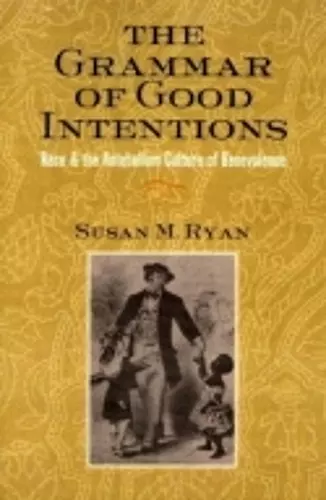The Grammar of Good Intentions
Race and the Antebellum Culture of Benevolence
Format:Paperback
Publisher:Cornell University Press
Published:14th Dec '04
Currently unavailable, and unfortunately no date known when it will be back
This paperback is available in another edition too:
- Hardback£47.00(9780801439551)

Susan M. Ryan explores antebellum Americans' preoccupation with the language and practice of benevolence. Drawing on a variety of cultural and literary texts, she traces how people working and writing within social reform movements—and their outspoken opponents—helped solidify racial and class ideologies that ultimately marginalized even the most "deserving" poor. "The links between race and the relations of benevolence occasioned much soul-searching among antebellum Americans," Ryan explains. "In a period of heated public debate over issues such as slavery, Indian removal, and non-Protestant immigration, the categories of blackness, Indianness, and a generic 'foreignness' came to signify, for many whites, need itself."
Ryan puts familiar literary works such as Herman Melville's The Confidence-Man, Frederick Douglass's My Bondage and My Freedom, and Harriet Beecher Stowe's Uncle Tom's Cabin back into dialogue with a broad range of print materials: the reports of charity societies, African American and Native American newspapers, juvenile fiction, travel writing, cartoons, sermons, and tract literature. In the process, she dispels the myth that authors usually classified as literary were responding to a simple and unquestioned cult of benevolence. Rather, she contends, they were participating in the complex and often rancorous debates occurring within the broader culture over how good intentions should be expressed and enacted.
Ryan's inquiry into the antebellum culture of benevolence has implications for contemporary U.S. society, resonating especially with recent debates over welfare reform, the politics of compassionate conservatism, and representations of "welfare queens" and violent urban youth. As Ryan writes, "The conversations that this book reconstructs remind us of our ongoing participation in the national ritual of laying claim to good intentions."
In the field of new literary historicism, the intersection in antebellum America of sentimentality, masculinity, and citizenship has received rich and renewed attention in recent years. Susan M. Ryan's first book contributes to this growing field of study, building on the work of... others, even as she sets herself apart from certain tendencies in the field. As she does so, Ryan also makes a substantial contribution to the historiography of antebellum reform movements, investigating racial dynamics that historians have long recognized but seldom examined.
* Journal of the Early Republic *The antebellum United States was awash with projects to do good. Indeed, a commitment to benevolence was vital to the Protestant middle class's confidence that it exemplified the nation's goodness.... Ryan explores an impressive range of texts spanning the period from Indian removal to the Civil War.... Ryan's interpretations of the etiquette of charity and the meanings of literacy... are insightful, and she makes connections that are often original and occasionally startling.
* Journal of American History *In this stimulating, well-written book, Ryan argues that the pre-Civil War 'culture of benevolence' (both private and institutional charity and various forms of 'uplift' for those considered 'needy,' whether 'foreign,' Irish, American Indian, or black) was a 'contest of moral authority at the core of which lay a conflict over the character of the nation as well as the 'conditions and prospects'... of its constituent racial groups.... Summing Up: Recommended. Upper-division undergraduates and above.
* Choice Magazine *Ryan's treatment of Harriet Beecher Stowe's novels Uncle Tom's Cabin and Dred is the strongest and most penetrating part of the book. With incisive and nuanced readings of these texts, Ryan illustrates how, for Stowe, benevolent agency became the marker of American citizenship and how her fiction worked to advance and 'energize' that confluence. Ryan's analytical agility is exemplified here by solid, small-scale readings of pro-slavery novels written in response to Uncle Tom's Cabin.... The Grammar of Good Intentions is a valuable study of a cultural transformation that recast the terms of national unity and American citizenship.... This book will reward the attention of every student of antebellum culture.
* New England QuarterISBN: 9780801489853
Dimensions: 235mm x 155mm x 16mm
Weight: 454g
256 pages